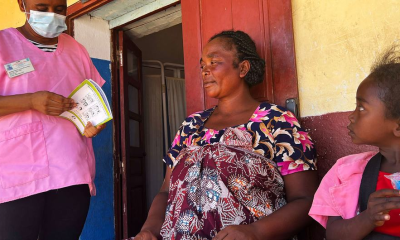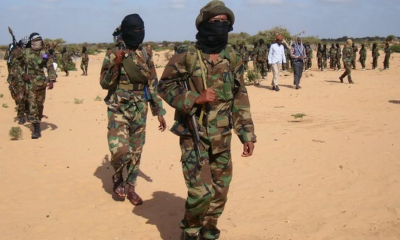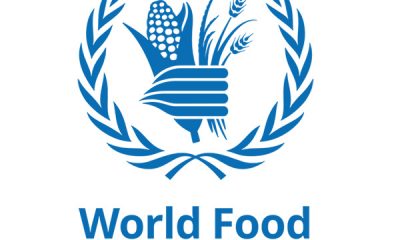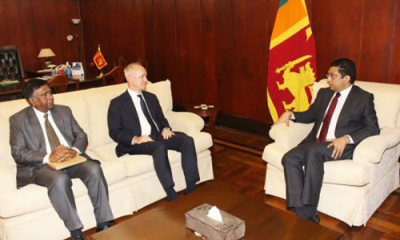News
Sri Lankans struggling to buy food, says WFP report
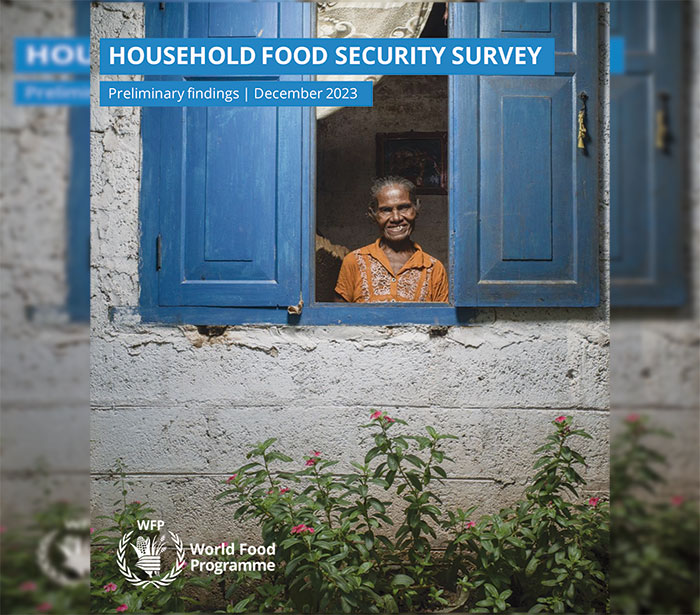
Nearly a half of Sri Lanka’s households are adopting livelihood-based coping strategies to buy food, says a recent report published by the World Food Programme.
The WFP’s ‘Sri Lanka – Household Food Security Survey: Preliminary Findings, December 2023’ says that 43 percent of households were adopting livelihood-based coping strategies to cope with the lack of adequate food. Borrowing money to buy food and purchasing food on credit were the most commonly adopted strategies, by 27 and 26 percent of households, respectively, says the report, adding that households remain vulnerable to future shocks and stresses.
“According to the survey, a high proportion of estate households (80 percent) adopted livelihood-based coping strategies, followed by 50 percent of urban households. In the rural sector, 41 percent of households are resorting to coping strategies. In terms of household characteristics, 43 percent of male-headed households and 42 percent of female-headed households are turning to livelihood-based coping strategies. While this is not a significant difference, a larger proportion of female-headed households are adopting more severe coping strategies compared to male-headed households such as selling assets and spending savings,” it said.
The report has identified six livelihood-based coping strategies such as borrowing money, purchasing food on credit, spending savings or skipping debt payment, selling jewellery to buy food, reducing the spending on education and health and selling household assets. It has been observed that 27 percent of households relied on borrowing money while 26 percent opted for purchasing food on credit. Five percent of the household sample of the survey resorted to selling household assets and 16 percent chose to sell jewellery to buy food. It has been observed that 19 percent of the sample relied on the strategy of spending savings or skipping debt payment while 14 percent reduced spending on education and health.
According to the survey, households relying on social protection schemes, such as Samurdhi, as their main source of income have the highest levels of food insecurity (57 percent), followed by households dependent on humanitarian assistance (49 percent), and unskilled agricultural labour (37 percent). The lowest percentage of food insecure households are among those who have regular and stable income sources.
When comparing the survey results with March 2023, agricultural producers reported a significant deterioration in their food security status. For instance, a larger proportion of households relying on the production and sale of vegetables and fruits, and staple crops such as rice are food insecure during the current reporting period compared to March which was Maha harvest season.
The report said: “WFP and FAO jointly conducted a second CFSAM in March 2023, where a significant improvement in food security was noted, with 17 percent of the population estimated to be food insecure. This 11-percentage point decrease is attributed to better food consumption due to reduced prices and improved income during the harvesting period.
“Between August and October 2023, WFP conducted a panel survey of 8,741 households that were interviewed in March through a face-to-face data collection approach to produce representative estimates at national and regional levels. The survey employed a 2-stage stratified cluster sampling methodology in which a fixed number of primary sampling units (PSUs) were randomly selected at the first stage and within each PSU, 10 households were selected for interview.
“This preliminary report provides an update on the overall food security situation since March 2023, and it comes as part of WFP’s efforts to expand its evidence generation initiatives to inform the response among government and humanitarian/development partners in Sri Lanka.”
News
US sports envoys to Lanka to champion youth development

The U.S. Embassy in Colombo welcomed the U.S. Sports Envoys to Sri Lanka, former National Basketball Association (NBA) and Women’s National Basketball Association (WNBA) players Stephen Howard and Astou Ndiaye, from June 8 through 14.
The Public Diplomacy section of the U.S. Embassy said that it would launch a weeklong basketball program intended to harness the unifying power of sports, made possible through collaboration with Foundation of Goodness and IImpact Hoop Lab.
While in Sri Lanka, Howard and Ndiaye, both retired professional basketball players, will conduct a weeklong program, Hoops for Hope: Bridging Borders through Basketball. The Sports Envoys will lead basketball clinics and exhibition matches and engage in leadership sessions in Colombo and Southern Province for youth aged 14-18 from Northern, Uva, Eastern and Western Provinces, offering skills and leadership training both on and off the court. The U.S. Envoys will also share their expertise with the Sri Lanka Basketball Federation, national coaches, and players, furthering the development of basketball in the country. Beyond the clinics, they will collaborate with Sri Lankan schoolchildren to take part in a community service project in the Colombo area.
“We are so proud to welcome Stephen and Astou as our Sports Envoys to Sri Lanka, to build on the strong people-to-people connections between the United States and Sri Lanka,” said U.S. Ambassador Julie Chung. “The lessons that will be shared by our Sports Envoys – communication, teamwork, resilience, inclusion, and conflict resolution – are essential for leadership development, community building, equality, and peace. The U.S. Sports Envoy program is a testament to our belief that sports can be a powerful tool in promoting peace and unity.”
News
Rahuman questions sudden cancellation of leave of CEB employees

SJB Colombo District MP Mujibur Rahuman in parliament demanded to know from the government the reasons for CEB suspending the leave of all its employees until further notice from Thursday.
MP Rahuman said that the CEB has got an acting General Manager anew and the latter yesterday morning issued a circular suspending leave of all CEB employees with immediate effect until further notice.
“We demand that Minister Kanchana Wijesekera should explain this to the House. This circular was issued while this debate on the new Electricity Amendment Bill was pending. There are many who oppose this Bill. The Minister must tell parliament the reason for the urge to cancel the leave of CEB employees,” the MP said.However, Speaker Mahinda Yapa Abeywardena prevented Minister Wijesekera responding to the query and said that the matter raised by MP Rahuman was not relevant.
News
CIPM successfully concludes 8th Annual Symposium

The Chartered Institute of Personnel Management (CIPM) successfully concluded the 8th Annual CIPM Symposium, which took place on 31st May 2024. Themed “Nurturing the Human Element—Redefining HRM in a Rapidly Changing World,” the symposium underscored the pivotal role of human resource management (HRM) in today’s dynamic global landscape. Since its inception in 1959, CIPM has been dedicated to advancing the HR profession through education, professional development, and advocacy, solidifying its position as Sri Lanka’s leading professional body for HRM.
Ken Vijayakumar, the President of the CIPM, graced the occasion as the chief guest. The symposium commenced with the welcome address by the Chairperson, Prof. Arosha Adikaram, followed by the Web Launch of the Symposium Proceedings and Abstract Book by the CIPM President. The event featured distinguished addresses, including a speech by Chief Guest Ken Vijayakumar, President of CIPM, and an address by Guest of Honor Shakthi Ranatunga, Chief Operating Officer of MAS Holdings Pvt. Ltd., Sri Lanka.
The symposium also featured an inspiring keynote address by Prof. Mario Fernando, Professor of Management and Director of the Centre for Cross Cultural Management (CCCM) at the University of Wollongong, Australia.
Vote of Thanks of the inauguration session was delivered by Dr. Dillanjani Weeratunga, Symposium Co-chair.
The symposium served as a comprehensive platform for researchers to present their findings across a wide range of critical topics in HRM. These included Cultural Diversity and Inclusion, Talent Development and Retention, Ethical Leadership and Corporate Social Responsibility, Adapting to Technological Advancements, Mental Health and Well-being at Work, Global Workforce Challenges, Employee Empowerment, and Reskilling and Upskilling.
The plenary session was led by Prof. Wasantha Rajapakse. Certificates were awarded to the best paper presenters during the valedictory session, followed by a vote of thanks delivered by Kamani Perera, Manager of Research and Development.
The annual symposium of CIPM was a truly inclusive event, attracting a diverse audience that spanned undergraduates, graduates, working professionals, research scholars and lecturers. This widespread interest highlights the symposium’s significance in the field of HRM, offering a unique opportunity for everyone to network and learn from scholarly brains.The CIPM International Research Symposium was sponsored by Hambantota International Port, Sri Lanka Institute of Information Technology (SLIIT), E B Creasy & Co. PLC, and Print Xcel Company.


